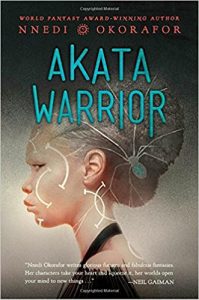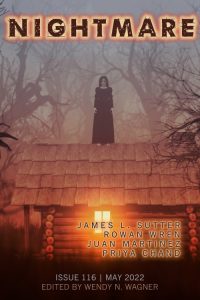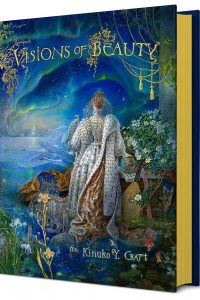Gary K. Wolfe reviews Akata Warrior by Nnedi Okorafor
Akata Warrior, Nnedi Okorafor (Viking 978-0-6707-8561-2, $18.99, 480pp, hc) October 2017
 It’s been more than six years since Nnedi Okorafor’s Akata Witch, which introduced us to Sunny Nwazue, the American-born daughter of Nigerian parents (or Naijamerican) who moves to Nigeria at 12, begins to discover her own latent powers as a “free agent,” joins the secret society of Leopard people, discovers the magical hidden village of Leopard Knocks, and finally faces down a fearsome serial killer with supernatural powers of his own, who was trying to bring a malevolent masquerade named Ekwensu into the world. Sunny is only a year and a half older in Akata Warrior, but her story has shifted from what was largely a tale of initiation and education (with even a few echoes of Harry Potter) into a full-blown epic, with the fate of the world, along with Sunny’s entire identity – in the balance. As before, she’s accompanied by her band of compatriots: Chichi, with her photographic memory; the slightly older Orlu, whose dyslexia somehow gives him a talent for undoing juju, and the fifteen-year-old Sasha, an American from the south side of Chicago sent to Nigeria as a way of addressing his authority issues, largely an outgrowth of his superior intelligence and analytical skill. Also as before, her clueless and overprotective Muggle-like parents, or Lambs as the non-magical folk are called by the Leopard people, and her irresponsible older brother are only vaguely aware of Sunny’s powers.
It’s been more than six years since Nnedi Okorafor’s Akata Witch, which introduced us to Sunny Nwazue, the American-born daughter of Nigerian parents (or Naijamerican) who moves to Nigeria at 12, begins to discover her own latent powers as a “free agent,” joins the secret society of Leopard people, discovers the magical hidden village of Leopard Knocks, and finally faces down a fearsome serial killer with supernatural powers of his own, who was trying to bring a malevolent masquerade named Ekwensu into the world. Sunny is only a year and a half older in Akata Warrior, but her story has shifted from what was largely a tale of initiation and education (with even a few echoes of Harry Potter) into a full-blown epic, with the fate of the world, along with Sunny’s entire identity – in the balance. As before, she’s accompanied by her band of compatriots: Chichi, with her photographic memory; the slightly older Orlu, whose dyslexia somehow gives him a talent for undoing juju, and the fifteen-year-old Sasha, an American from the south side of Chicago sent to Nigeria as a way of addressing his authority issues, largely an outgrowth of his superior intelligence and analytical skill. Also as before, her clueless and overprotective Muggle-like parents, or Lambs as the non-magical folk are called by the Leopard people, and her irresponsible older brother are only vaguely aware of Sunny’s powers.
Okorafor has a fondness for inventing fictional books that help guide her characters – the “Great Book” in Who Fears Death, the breezy Leopard person guidebook Fast Facts for Free Agents in Akata Witch, and now the more mysterious and powerful Nsibidi: The Magical Language of the Spirits, by Sunny’s trickster mentor and Leopard society librarian Sugar Cream (like many of Okorafor’s magical talismans, Nsibidi is an actual symbol system of unclear but ancient origins). Although difficult and sometimes dizzying for her to unpack, the book seems to represent Sunny’s graduate education, compared to her earlier orientation in magic, and it’s a good thing she’s a fast learner: when she is attacked by a lake monster while returning from Leopard Knocks, and then saved by a mysterious spirit-woman, she begins to realize that another, more consequential battle is in store for her. This one will involve Sunny and her companions journeying to Lagos to meet a terrifying spider-god named Udide and find a fabulous creature called a Grasscutter, which will transport them to the hidden magical city of Osisi to confront Ekwensu directly. Despite being weakened by separation from her spirit face, Anyanwu, and briefly distracted by her older brother’s having impulsively joined a dangerous secret society (from which she needs to rescue him through a combination of magic and tricksterism), Sunny reluctantly accepts her responsibility. As in the earlier novel, Sunny’s own impulsiveness and immaturity lead her into troubles of her own making, and a good part of her charm lies in these reminders that she’s still a young teen with a seriously incomplete education.
Also as in the earlier novel, Okorafor offers a clear-eyed view of the real Nigeria and its problems; en route to Lagos, for example, Sunny and her friends are stopped more than once by police (or pretend-police) who demand that they “do Christmas” by coughing up bribes on the spot, and as before Sunny has to grapple with her outsider “akata” status and the light skin and hair that results from her albinism. Stylistically, Okorafor still has a few quirks, such as a fondness for exclamation points or onomatopoeic sound effects (“scraaaaape,” “tap, tap, tap”) that can either seem a hiccup in the narration or a nod to comics and oral tradition, but they don’t really seem out of place as a reminder that this is, after all, a book about kids trying to learn the world, even as they need to battle a few cosmic terrors along the way. Akata Warrior turns out to indeed be the epic that Akata Witch seemed to promise, and it’s a pretty spectacular one at that.
This review and more like it in the September 2017 issue of Locus.







